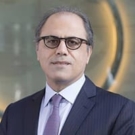Speaker

Jihad Azour
Director, Middle East and Central Asia Department
International Monetary Fund
Moderator
Event Summary
On May 6, 2020, Arab Center Washington DC Executive Director Khalil E. Jahshan conducted an interview with Dr. Jihad Azour, Director of the International Monetary Fund’s (IMF) Middle East and Central Asia Department. The topic was “Arab Economies Post COVID-19: Prospects, Recovery Efforts, and Recommended Measures.”
Azour said that the current economic crisis caused by COVID-19 is not like that of 2008-2009 since it has precipitated a deeper and wider shock to the economies of individual countries as well as to the international economy at large. What also specifically differentiates the current economic crisis is the degree and level of uncertainty associated with it. He said that the international community and organizations knew what instigated the 2008 financial crisis; however, the severity and impact of the current one remains unknown, thus addressing its effects is still indeterminable. Azour said that in any case, there should be an emphasis on priorities: saving lives and livelihoods, helping the agents of growth such as companies and the private sector, and preparing for a sustainable future. He stressed that the IMF’s current policy is to give breathing space so that “emerging economies and low income countries are not left behind” in this period.
Addressing the issue of countries approaching the Fund for loans, Azour stated that the IMF has already helped some 30 low income countries by providing liquidity so they can meet their financial obligations. This is a lending operation, he said, in which “we need to make sure that the countries have the capacity to repay.” No well-off countries are receiving direct assistance, but the Fund is providing them with technical consultations. He said that the Fund is also advising on dealing with structural conditions in low income countries such as unemployment, health care, institutional development, technology deficits, high debt ratios, inequality and poverty, corruption, poor governance, and marginalized communities of refugees. All these are problems in the Arab world as well, Azour asserted, and the IMF deals with Arab countries the same way it deals with others suffering from similar challenges.
In answering a question on whether the world should think of the current economic woes as a new normal, Azour stated that it all depends on how countries individually and collectively deal with these conditions. In fact, he said, there is no known normal yet. But what is noteworthy is that technology will remain the important tool for growth, as will global trade and the expansion and sustainability of the service sector. He predicted that there will be a new globalization effort that may try to address the deficiencies of the former international economy. The international economy, he argued, will have to determine how to address challenges to growth and to make sure that this growth is equitable between low income and developed countries. He stated that “what is important at this stage is not to lose the opportunity of having a crisis in order to address some of the challenges that we had in the past.”
For Arab economies, Azour stated, there has been a multilevel shock from COVID-19, despite the fact that many states responded to the pandemic quickly, adding that low oil prices have impact on both oil- and non-oil-producing countries. Starting with long-term structural problems, Arab countries will have difficulties addressing the direct impact of the ongoing slowdown. One thing that helps in the recovery in Arab countries is that they have young populations, Azour said. What is needed, he noted, are dedicated efforts to implement what Arab governments and international organizations know are essential reforms to the structure and emphasis of Arab economies.
Speaker Bio

Jihad Azour has been the Director of the International Monetary Fund’s Middle East and Central Asia Department (MCD) since March 2017. Mr. Azour served as Lebanon’s Finance Minister during 2005–08, during which time he coordinated the implementation of important reform initiatives at the national level and within the Finance Ministry. Before and since his time as finance minister, he held a wide range of posts in the private sector, including McKinsey and Booz and Co. where he served as vice president and senior executive advisor between 2009–13. Prior to joining the Fund he was a managing partner at advisory and investment firm Inventis Partners. Mr. Azour holds a PhD in International Finance and a post-graduate degree in International Economics and Finance, both from the Institut d’Etudes Politiques de Paris. He also did research on emerging economies and their integration into the global economy as a post-doctoral fellow at Harvard, and holds a Master’s degree in Applied Economics and Finance from Dauphine University, Paris. He has published five books and several articles on economic and financial issues and taught extensively.

